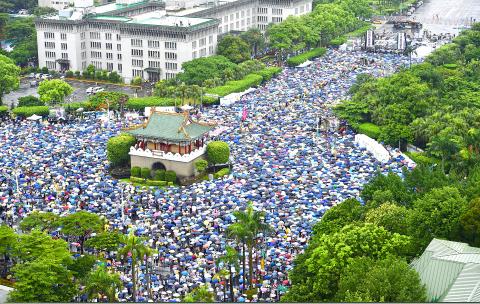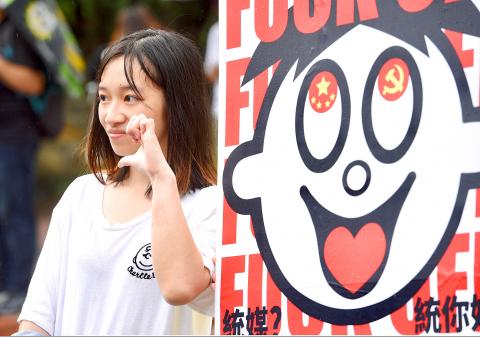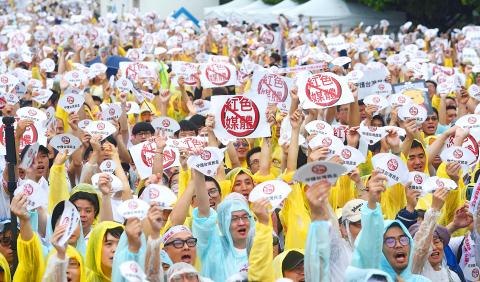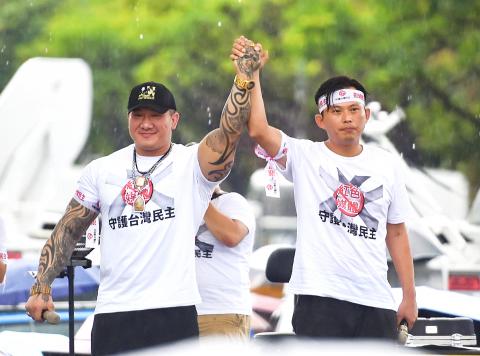Tens of thousands of people yesterday rallied in Taipei to protest against media outlets that spread fabricated news for Beijing and called for tighter regulations to counter China’s manipulation of local media.
Demonstrators started arriving on Ketagalan Boulevard in front of the Presidential Office Building as early as 7am, despite the rain, for the protest, which began at 2pm.
The purpose of the rally is to oppose Chinese authoritarianism, said Internet celebrity Holger Chen (陳之漢), who organized the protest with New Power Party (NPP) Legislator Huang Kuo-chang (黃國昌).

Photo: Peter Lo, Taipei Times
China has seriously infiltrated Taiwan’s media and businesses, with CtiTV News (中天新聞) being an obvious example, he said.
The network “reports whatever it likes and promotes [certain politicians] to a godlike status,” he said, adding that he wonders how many people have been brainwashed by its so-called news.
“We want such media outlets to go away,” he said, urging people to stand up against media manipulation and defend Taiwan regardless of their age and party affiliation.

Photo: Peter Lo, Taipei Times
Chen said that before the rally, a representative from Want Want China Times Media Group (旺旺中時集團) — which owns CtiTV and the Chinese-language China Times newspaper — approached him, asking for a chance to clarify things on his Internet show and saying they were willing to make improvements.
He told the representative that all they need to do is to report about the Tiananmen Square Massacre and human rights violations in Hong Kong, Chen said.
He was referring to reports earlier this month that the China Times gave only limited coverage to massive protests against a controversial extradition bill in Hong Kong and that it removed all content directly related to the massacre shortly after the incident’s 30th anniversary.

Photo: Liu Hsin-de, Taipei Times
Hopefully, the rally will prompt lawmakers to improve laws to counter Chinese infiltration and motivate the executive branch to crack down on media outlets that have been infiltrated, Huang said.
“It is important that we build a defense mechanism based on the idea of ‘defensive democracy’ to protect Taiwan’s democracy and the rule of law, which are under attack,” he said.
The freedoms of speech and the press should be protected, but there must be boundaries, he added.

Photo: Liu Hsin-de, Taipei Times
Huang said he had invited all major parties and presidential hopefuls to the rally, but only the Democratic Progressive Party (DPP) and the NPP sent representatives.
“China has not only infiltrated Taiwan’s media, but also its schools, communities, temples and other organizations,” DPP Secretary-General Luo Wen-jia (羅文嘉) told the crowd.
To counter Chinese infiltration, which aims to chip away at Taiwan’s democracy, the nation needs to have laws requiring companies controlled by foreign states to disclose their relationship and related activities, he said.
Taiwan does not need news media that distort the truth to promote the interests of Beijing, NPP Chairman Chiu Hsien-chih (邱顯智) said.
The NPP legislative caucus would push for the passage of laws against infiltration and other national security bills, he added.
Former Causeway Bay Books manager Lam Wing-kei (林榮基), filmmaker Kevin Lee (李惠仁) and Taipei City councilors Chiu Wei-chieh (邱威傑) and Miao Po-ya (苗博雅) also attended the rally.

Intelligence agents have recorded 510,000 instances of “controversial information” being spread online by the Chinese Communist Party (CCP) so far this year, the National Security Bureau (NSB) said in a report yesterday, as it warned of artificial intelligence (AI) being employed to generate destabilizing misinformation. The bureau submitted a written report to the Legislative Yuan in preparation for National Security Bureau Director-General Tsai Ming-yen’s (蔡明彥) appearance before the Foreign Affairs and National Defense Committee today. The CCP has been using cognitive warfare to divide Taiwanese society by commenting on controversial issues such as Taiwan Semiconductor Manufacturing Co’s (TSMC, 台積電) investments in the

HELPING HAND: The steering committee of the National Stabilization Fund is expected to hold a meeting to discuss how and when to utilize the fund to help buffer the sell-off The TAIEX plunged 2,065.87 points, or 9.7 percent, to close at 19,232.35 yesterday, the highest single-day percentage loss on record, as investors braced for US President Donald Trump’s tariffs after an extended holiday weekend. Amid the pessimistic atmosphere, 945 listed companies led by large-cap stocks — including Taiwan Semiconductor Manufacturing Co (TSMC, 台積電), Hon Hai Precision Industry Co (鴻海精密) and Largan Precision Co (大立光) — fell by the daily maximum of 10 percent at the close, Taiwan Stock Exchange data showed. The number of listed companies ending limit-down set a new record, the exchange said. The TAIEX plunged by daily maxiumu in just

INVESTIGATION: The case is the latest instance of a DPP figure being implicated in an espionage network accused of allegedly leaking information to Chinese intelligence Democratic Progressive Party (DPP) member Ho Jen-chieh (何仁傑) was detained and held incommunicado yesterday on suspicion of spying for China during his tenure as assistant to then-minister of foreign affairs Joseph Wu (吳釗燮). The Taipei District Prosecutors’ Office said Ho was implicated during its investigation into alleged spying activities by former Presidential Office consultant Wu Shang-yu (吳尚雨). Prosecutors said there is reason to believe Ho breached the National Security Act (國家安全法) by leaking classified Ministry of Foreign Affairs information to Chinese intelligence. Following interrogation, prosecutors petitioned the Taipei District Court to detain Ho, citing concerns over potential collusion or tampering of evidence. The

‘COMPREHENSIVE PLAN’: Lin Chia-lung said that the government was ready to talk about a variety of issues, including investment in and purchases from the US The National Stabilization Fund (NSF) yesterday announced that it would step in to staunch stock market losses for the ninth time in the nation’s history. An NSF board meeting, originally scheduled for Monday next week, was moved to yesterday after stocks plummeted in the wake of US President Donald Trump’s announcement of 32 percent tariffs on Taiwan on Wednesday last week. Board members voted to support the stock market with the NT$500 billion (US$15.15 billion) fund, with injections of funds to begin as soon as today. The NSF in 2000 injected NT$120 billion to stabilize stocks, the most ever. The lowest amount it